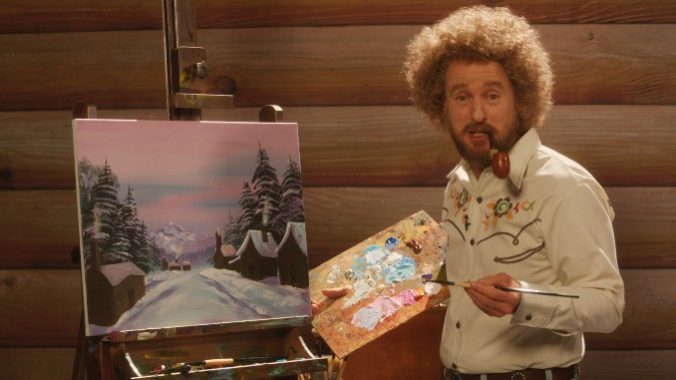Owen Wilson Loses the Joy of Painting in Insipid Bob Ross Pastiche Paint

Over 30 years ago, artist Bob Ross delighted and calmed PBS audiences with his half-hour long low-budget episodes of The Joy of Painting, in which the fluffy-haired host taught would-be artists simple techniques for landscape oil painting in a soothing, gentle voice. His aim? To show that “anyone can paint.” Long after Ross passed away (from lymphoma, shortly following the end of the show’s original run), Ross, his distinctive look, his palette, his easel and his disposition, have regained popularity as a meme. It makes sense—given the rise in memes as a sort of neo-Dadaist absurdism to counter our frightening reality—that Bob Ross would emerge both as part of this movement and in spite of it. There is a silliness to his schtick that doesn’t gel with present times, but his kindly demeanor and earnest artistic approach of self-acceptance has struck a chord. Not to mention the original appeal of his show still persists; read comments, and people still watch YouTube clips and Twitch streams of The Joy of Painting to relax. His videos have immense popularity in the ASMR community.
And if Cocaine Bear recently proved anything, it’s that if something is meme-worthy, then surely it must be movie-worthy as well. No, not a movie about the life and legacy of the real Bob Ross, but a movie born from the memes of Bob Ross. What do I mean by that? Well, like the premise of Cocaine Bear is “Wouldn’t it be epicsauce if a bear was on cocaine?” the premise of writer/director Brit McAdam’s perplexing feature debut, Paint, is “Wouldn’t it be epicsauce if Bob Ross was a philandering pussyhound at the PBS station he worked at?” Paint lazily plays with the pop cultural fixation on Ross as a benevolent, clean-cut communal force and positions itself as the first to wonder, instead, what if Ross was…actually a bit of a player?
There is some charm in putting Owen Wilson in a big blond afro and casting him as Ross analogue Carl Nargle, whose soft-spoken artistic egocentrism and womanizing conjures to mind The Royal Tenenbaums’ Eli Cash. Carl Nargle—whose name is maybe the funniest thing about Paint—is the star of PBS’s Paint with Carl Nargle, based out of Burlington, Vermont. Sadly, funds are low despite high, passionate viewership, so station manager Tony (Stephen Root) tells Carl they’ll need him on two back-to-back, hour-long painting sessions.
But Tony goes back on this idea and instead hires young, fresh-faced Ambrosia (Ciara Renée) to host an episode of Paint after Carl’s, in order to corner the younger market neglected by Carl’s more middle-aged audience. Ambrosia is a talented painter whose erratic, scary paintings counter Carl’s placid landscapes of Vermont’s Mount Mansfield, which Carl has grown increasingly attached to painting as of late. Carl’s losing his creative spark, and he has scorned the women of his office with his impermanent affections—save for one, Jenna (Lucy Freyer), who becomes Carl’s new part-time lover. Out with the old guard and in with the new blood, as Ambrosia begins moving in on Carl’s past sexual conquests as well, starting with Katherine (Michaela Watkins), who’s preparing a move to PBS Albany that’s complicated by her enduring feelings for Carl.
-

-

-

-

-

-

-

-

-

-

-

-

-

-

-

-

-

-

-

-

-

-

-

-

-

-

-

-

-

-

-

-

-

-

-

-

-

-

-

-








































